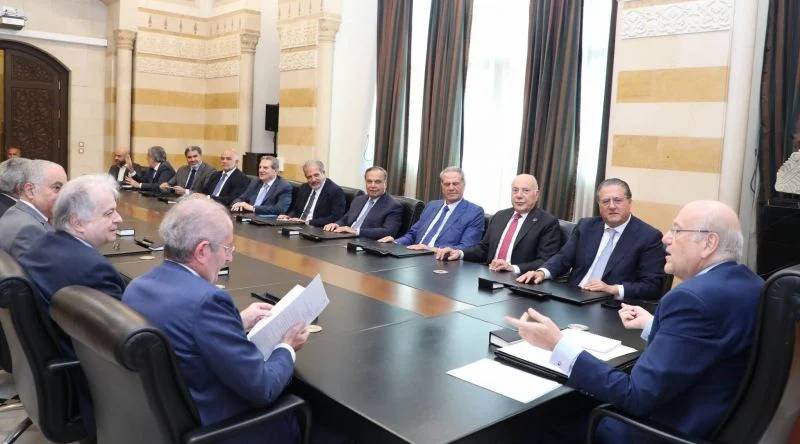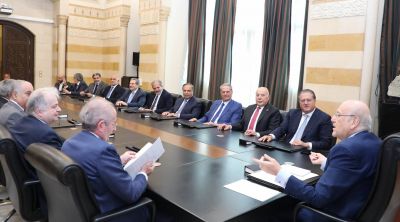
A delegation, including the president of the economic organizations, Mohammad Choucair, and the president of the Beirut Traders Association, Nicolas Chammas, went to the Grand Serail yesterday to discuss with the Prime Minister designate, Najib Mikati. (Courtesy of Dalati and Nohra)
Announced as imminent at the end of last week, the increase in the exchange rate used to calculate customs duties in Lebanese lira from the dollar prices of imported and exported goods — called the "customs dollar" by the authorities — has now been stalled, in the context of a Lebanon in crisis, marked by a sharp depreciation of the currency, high inflation, banking restrictions and a strike by many civil servants.
No official seems willing to take on the task of raising the rate, currently set at the official parity of LL1,507.5 to the dollar, to LL20,000 as decided by the caretaker government at an informal meeting last week, in a matter that has been on the table since the beginning of the year.
Although the meeting scheduled on Friday between the outgoing Minister of Finance, Youssef Khalil, and the Minister of Economy and Trade, Amin Salam, was held Monday, it did not result in any announcement, although it was supposed to serve to adjust the various tax ratios, particularly concerning food goods, ahead of a rate adjustment that was to be made in the coming days. The press offices of both ministers had no information to relay when contacted by L’Orient-Le Jour.
Second highest inflation in the world
During a Monday meeting with a delegation from various economic bodies, including Khalil and the employers' organization chaired by former Telecommunications Minister and businessman Mohammad Choucair, noted that the file had been put on hold. "The surprise is that there will be no government initiative to make this adjustment, given that the Council of State ruled, in an opinion issued after being referred by the Presidency of the Republic, that the coverage provided by Law No. 93 of 2018 applied to the tax rate and not the exchange rate used," explained President of the Beirut Merchants Association and secretary general of the employers’ association.
Law No. 93 of Oct. 10, 2018, where Parliament granted the government the right to intervene for five years in the customs field (while this is in principle the responsibility of the legislative branch). On the other hand, some experts had considered that this prerogative could only be granted to a full government and not to an executive in charge of current affairs as is currently the case — the government of Najib Mikati having resigned in the wake of the May 15 legislative elections and still not having been replaced. But the Prime Minister-designate did try to pass the measure via a traveling decree that the president did not sign, before asking the finance minister to do so via a written request after the informal meeting of ministers last Tuesday.
But nothing has happened yet, especially since the decision to multiply the exchange rate of the customs dollar by 13 times was criticized by many, including the Gathering of Lebanese Leaders and Entrepreneurs (RDCL). Believing that the measure had not been studied upstream, the association spoke this weekend in favor of a unification of the dollar and Lebanese lira exchange rates that currently coexist (the official rate, the market rate at about 34,000 pounds to the dollar, the withdrawal rate of Circular No. 151 at LL8,000, etc.) coupled with a decrease in the rates of taxation of existing customs duties to ensure a transition thus able to limit inflation related to the adjustment of customs duties. For economic organizations, speaking through Mohammad Choucair, a temporary solution would be to increase the rate of the customs dollar in a more gradual way, with a first step between "LL8,000 and LL10,000." At the policy level, Hezbollah Secretary General Hassan Nasrallah said in a speech on Friday that raising the rate of the customs dollar to 20,000 pounds was "harmful and inappropriate," also calling for the repercussions of such a decision to be properly studied.
It remains difficult to measure the exact impact of this measure, given that the tariffs are very different from one product to another (some are exempt, others are taxed up to 70%). Analysts at Fitch Solutions recently raised their forecast for annual inflation in Lebanon in 2022 by 22.3 percentage points, from 155.7% to 178%, as a result of the one-time increase in the customs dollar to LL20,000, as well as increases in shipping costs and telecom tariffs (last July). For Fitch, this would be the second highest inflation rate in the world after Sudan. In Beirut, Mohammad Chamseddine of the Information International Research Center estimated that tariffs could rise from LL470 billion to LL3.2 trillion with a LL20,000 customs dollar.
Hot potato
These projections could remain dead if the executive branch drops the file and Parliament, with the aim to relegate the hot potato, does not take the initiative. "The outgoing government has not done things in order, that is to say, prepare a bill that proposes to increase the rate used to calculate the amounts of customs duties in lira based on a solid impact study on prices and providing a series of levers to fight against abuses and prevent that the measure does not benefit smuggling," regrets the chairman of the Committee on Finance and Budget, Ibrahim Kanaan, during an interview with L’Orient-Le Jour on Monday. In theory, the projections for the implementation of such an adjustment should have been included in the draft budget for 2022 prepared by the executive branch and currently being studied by the committee, with a view to being voted on by the plenary assembly. The text, which will be voted on outside the constitutional deadline, was transmitted last winter and is expected to be the subject of a final meeting on Thursday.
The adjustment of the customs dollar was supposed to quickly increase revenues so that the government could better pay civil servants who were unhappy that their salaries had not yet been adjusted to the depreciation of the lira and inflation. But the fact that its implementation is now uncertain raises the question of what alternatives exist. According to Zahle's MP, industrialist Michel Daher, speaking on Twitter, the absence of solutions would force the state to turn more money into cash and to draw on the foreign exchange reserves held by the Bank of Lebanon, which would contribute to further weakening the value of the national currency against the dollar. This is especially true since the ruling class still seems reluctant to tackle the reforms listed in the preliminary agreement reached on April 7 with the International Monetary Fund, the implementation of which could pave the way for the release of $3 billion in financial assistance over four years, a first step towards the recovery of the country.
This article was originally published in French on L'Orient-Le Jour.
